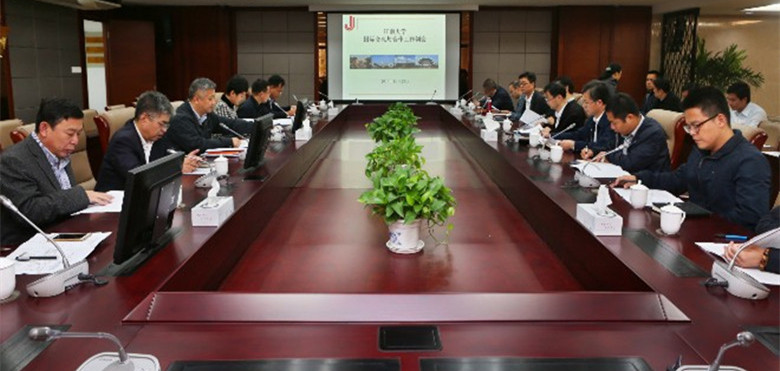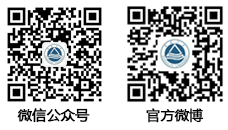On 28 October 2016, Jiangnan University held a meeting with the theme of promoting the English-taught Bachelor Program construction and the education cooperation with the Belt and Road countries. Xu Yan, Vice President of Jiangnan University, presided over the meeting. Vice deans of all the schools and deputy directors of the State Key Laboratory and the National Engineering Laboratory in charge of international affairs, Head of the Social Sciences Division, the Real Estate Management & Infrastructure Construction Division and all the staff members of the International Office attended the meeting.
On the basis of the Action Plan of Jiangnan University for Enlarging Educational Opening to the Outside World which was promulgated on September 1 this year and made clear the goal of developing the English-taught bachelor programs and curriculum groups to expand the scale of international students at Jiangnan University, this meeting made a summary of the early-stage achievements, and conducted discussions and deployment on the work plan of the next stage. Focusing on the theme of accelerating the development of English-taught bachelor programs and promoting education cooperation with the Belt and Road countries, representatives of the relevant functional departments and schools made a speech respectively.
The construction of English-taught bachelor program is not only an indispensable condition for expanding the scale of international students, but also an important means to improve the University's education level and cultivate international talents. School of Business and School of Design, which have initiated the English-taught bachelor program or curriculum group this semester, respectively introduced the implementation of the English-taught Business Administration and Industrial Design. Faced with both the "Coming In" and "Going Out" students, School of Business developed the English-taught programs respectively by combining the Overseas Students in China Program and the 3+1 Sino-foreign Cooperation Program in cooperation with Monash University, employing overseas teachers through multiple channels to participate in English-taught program teaching, and actively cultivating the English teaching faculty at the University at the same time.
School of Design actively makes use of its advantages in the number of long-term and short-term foreign teachers to carry out the English-taught curriculum group construction in industrial design. Currently, nine core courses have been fully covered in English teaching, and professional elective courses have realized 80-90% coverage.
School of Food Science and School of Bioengineering, which plan to begin the construction of English-taught bachelor program in 2017, respectively introduced their preparations. School of Food Science will gradually complete full coverage of English lecturing for the professional core courses and partial coverage for the professional elective courses, and plan to formally enroll international undergraduate students in the autumn of 2018. The School of Bioengineering will make full use of its in-staff overseas teachers and Chinese faculty members with many years of overseas experience to plan the English-taught core courses.
The meeting also discussed the common problems found in the course of implementation such as insufficient number of English-speaking teachers for specialized courses, insufficient English proficiency of the students, inadequate dormitory and teaching facilities, etc.
In order to expand the education opening to the outside world,serve the Belt and Road strategy,and enhance the international influence of the University, Jiangnan University made plans to speed up the top design and strategic deployment. School of International Education, School of Food Science and the Division of Social Sciences made presentations on their respective relevant programs. School of International Education focused on the analysis of student source markets and the results of the survey on students from the Belt and Road countries. It will make use of alumni resources at home and abroad to strengthen the construction of student sources and expand the scale of international students from the Belt and Road countries.
The idea of the food discipline to serve the Belt and Road strategy is to take advantage of its leading role in the discipline to broaden the cooperation with other colleges and universities on the basis of existing partners, forming Food Science Alliance with the food discipline of universities in the Belt and Road countries to promote intra-cooperation on scientific research among the alliance members and serve the food industry development. The schools of humanities and social sciences put forward the "going out" plan and established the Belt and Road research centers. It will conduct regional studies on the economic, cultural and social aspects of the countries concerned, and promote the mutual understanding, economic cooperation and cultural exchanges between the countries.
Vice President Xu Yan made a summary of the meeting, fully affirming the achievements made in in international exchanges and cooperation, the English-taught bachelor program construction and education cooperation with the Belt and Road countries. Meanwhile, he also put forward new work requirements, pointing out that the English-taught bachelor program construction and education cooperation with the Belt and Road countries are not only the needs of expanding the education opening to the outside world, but also the needs for the development of Jiangnan University.
According to Xu, the University’s functional departments and relevant schools should do a good job in the top design and make a clear positioning. Active efforts should be made to seek opportunities for cooperation with overseas institutions, focusing on promoting Sino-foreign cooperative education projects, vigorously introducing foreign teachers and strengthening the internationalization of the teaching staff. Active efforts should also be made on curriculum planning to accelerate the construction of the English-taught bachelor program to lift the University’s education level. Vice President Xu also mentioned that the University should serve the government’s overall plan, and continuously promote the education cooperation with the Belt and Road countries.

At the Meeting


